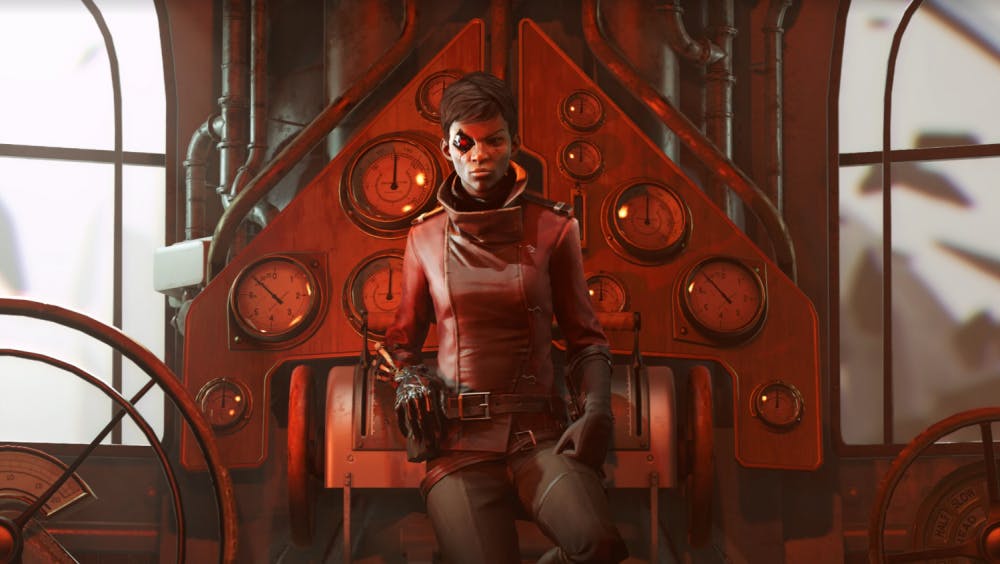 The satisfaction that comes from watching a Rube Goldberg machine in motion is something that is hard to properly replicate. A window slams shut, causing a tennis ball to bounce off a table into a cup that pulls a string, lifting a seesaw just enough to knock a line of dominos over until one falls off the table, turning the page of a book for a reader. It is something that is so utterly, terribly useless, but similarly fantastical in its unnecessary complexity. Each little piece fits perfectly in its place and feeds into the next, and the next, and the next, until the grand finale, when the purpose of the machine is somehow carried out.
The satisfaction that comes from watching a Rube Goldberg machine in motion is something that is hard to properly replicate. A window slams shut, causing a tennis ball to bounce off a table into a cup that pulls a string, lifting a seesaw just enough to knock a line of dominos over until one falls off the table, turning the page of a book for a reader. It is something that is so utterly, terribly useless, but similarly fantastical in its unnecessary complexity. Each little piece fits perfectly in its place and feeds into the next, and the next, and the next, until the grand finale, when the purpose of the machine is somehow carried out.
“Dishonored: Death of the Outsider” is a Rube Goldberg machine. Its purpose? Kill a god.
“Dishonored: Death of the Outsider” was developed by Arkane Studios and released on September 15, 2017 on PlayStation 4, Xbox One and Microsoft Windows. The game is an expansion of the Dishonored franchise and therefore builds on its world, story and lore. The game takes place primarily in Karnaca, a fictional city on the sea where apartments seem to emerge from the mountains surrounding the city’s port. As protagonist Billie Lurk, the player’s objective is to sneak through the streets of a city built and powered on the surplus of whale oil to find the key to killing the Outsider. The Outsider is a mysterious figure who had godly powers thrust upon him eons ago, and Lurk feels that the powers he represents and bestows onto others are too harmful to exist. So, the Outsider must go.
What makes “Dishonored: Death of the Outsider” so enjoyable, almost more so than the previous titles in the series, is how tight the playthrough experience is. About half of the player’s time in the game is spent in a downtown Karnacian neighborhood. Through the span of several levels, the player becomes very familiar with the city’s layout. The player will meet a shifty taxidermist, infiltrate the house of a snobbish singer and decide whether to kill or spare a mime just mimeing their own business. A contract system is in place through which the player can earn extra money by completing a myriad of lucrative black market quests that are full of charm in their own right. This push to complete each contract only further incentivizes the exploration of each alleyway, ramshackle home and rooftop. When the same buildings and areas are used, the player does not feel constricted; they feel like a local.
With each new task, the player gains more knowledge of the city’s goings-on. An art auction may be occurring in the local courtyard that the player had visited after spying on a politician preparing his speech. How the player approaches said auction can be determined by how they approached the politician’s speech. Will the player again use that trapdoor on the stage they found earlier?
The player becomes very confident in their spatial awareness. What was once a shadowy corner is now an opportunity. What was once another of the many apartments down the road is now the key to an optimal escape plan.
The tight level design is complemented by a small but mighty selection of gameplay mechanics. These include creating a spectre of Lurk to which a player can teleport, the ability to see through walls and mark your enemies and the ability to borrow an enemy’s face to slip past their comrades. Because there are so few powers (granted to the player by the same god whom they are trying to kill, mind you), their integration into the game is both seamless and well executed. A solitary guard is always ever-so-conveniently taking a smoke break just outside a heavily-patrolled area for the player to steal her face. A single window usually happens to overlook a courtyard where an auction is, almost tempting the player to hop down and teleport right back up, shiny object in tow. The developers know exactly what tools the player is exposed to, and as such, the levels are designed around them.
“Dishonored: Death of the Outsider” is a fantastic time. The game is such a polished package, and each piece is placed meticulously, so that it can deliver an experience that is hard to rival. The player has only a few powers to juggle in a select few areas, but they feel absolute in their confidence, like the mastermind assassin they are. The player is the one who helped kill an empress. The player is the one who will kill the god. The player is the catalyst for a Rube Goldberg machine of death and destruction.
Controlling chaos in “Dishonored: Death of the Outsider”

Comments



